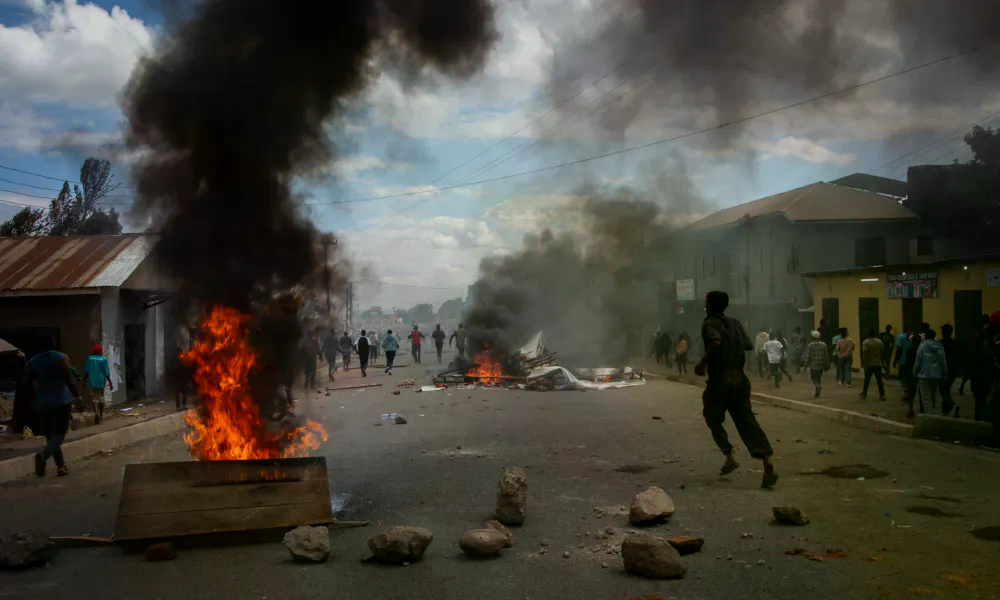
Tanzania’s main opposition party has claimed that hundreds of people have been killed in protests following this week’s disputed elections. The United Nations, however, has stated it has “credible reports” indicating at least 10 deaths.
Chadema, the leading opposition party, reported that the number of deaths in Dar es Salaam is around 350, with over 200 in Mwanza. Adding figures from other regions, the total could reach approximately 700, according to Chadema spokesperson John Kitoka, who spoke to AFP on Friday. The party claims its members have toured hospitals nationwide to compile the data. Meanwhile, a security source and a diplomat in Dar es Salaam both told AFP that the death toll was “in the hundreds.”
Al Jazeera has not been able to independently verify the number of deaths since the elections took place on Wednesday.
Tanzania’s Foreign Minister Mahmoud Thabit Kombo denied allegations of excessive force being used against protesters, stating that the government has no official figures on any deaths. “Currently, no excessive force has been used,” he said, rejecting the opposition’s claim of 700 deaths. He acknowledged pockets of violence and vandalism against government properties, including the burning of national electricity supply utilities.
The opposition’s reported death toll contrasts with the UN’s findings. In a briefing on Friday, UN human rights spokesperson Seif Magango noted that credible sources indicated at least 10 deaths caused by security forces. The UN called for an investigation into the use of force against protesters and urged de-escalation of tensions. Later that day, UN Secretary General Antonio Guterres expressed concern over reports of enforced disappearances and detentions, as reported by his spokesperson Stephane Dujarric.
Protests erupted in Dar es Salaam, home to more than seven million people, following the disputed and chaotic elections. The two main opposition parties were barred from participating, leading to widespread anger among citizens. Protesters set fire to several vehicles, a petrol station, and police stations, expressing frustration over restricted election choices and harassment of opposition figures.
On Friday, demonstrators continued their confrontation with police for the third consecutive day, demanding that the national electoral body halt the announcement of results. The government deployed military forces onto the streets and imposed an internet shutdown.
Chadema’s Kitoka told Reuters that the protests would continue until demands for electoral reforms were met. Earlier in the week, protesters defying a curfew in neighborhoods such as Mbagala, Gongo la Mboto, and Kiluvya faced tear gas and gunfire.
State television broadcasted the mainland results of Wednesday’s vote, which saw the ruling Chama Cha Mapinduzi (CCM) party seeking to extend its rule since 1961. President Samia Suluhu Hassan, who took office in 2021 after her predecessor, John Magufuli, died in office, faced criticism for what the UN described as a pattern of escalating attacks, disappearances, and torture of critics.
This election follows similar unrest in Ivory Coast and Cameroon, where long-standing leaders sought to remain in power. Only minor opposition figures were allowed to compete against Hassan after the Independent National Electoral Commission disqualified the Chadema party in April for refusing to sign an electoral code of conduct. Party leader Tundu Lissu was arrested at a rally advocating for electoral reforms and charged with treason.
The commission also barred Luhaga Mpina, the candidate for the second-largest opposition party, ACT-Wazalendo, following an objection from the attorney general. Local and international watchdogs have raised concerns about election-related violence and repression for months.
In June, a panel of nine UN experts criticized the government’s actions, citing over 200 disappearances since 2019. In September, Human Rights Watch documented at least 10 cases of politically motivated assaults, harassment, abductions, and torture, along with extensive restrictions on media and civil society organizations.
Nomathamsanqa Masiko-Mpaka, a researcher at HRW, warned that Tanzania’s October elections were at “great risk.” She urged authorities to stop silencing dissenting voices and instead implement meaningful reforms to ensure free, fair, and credible elections.
In Zanzibar, the ruling CCM retained the presidential seat, with incumbent President Hussein Mwinyi securing 78.8% of the votes. However, the opposition accused the electoral commission of “massive fraud” and announced plans to reveal its next steps.
The protests have spread across the country, prompting the government to delay the reopening of colleges and universities, originally scheduled for next Monday. Army chief Jacob John Mkunda condemned the violence and stated that the military would collaborate with other security agencies to manage the situation.


